Meet our 2022 Doctoral Student Cohort
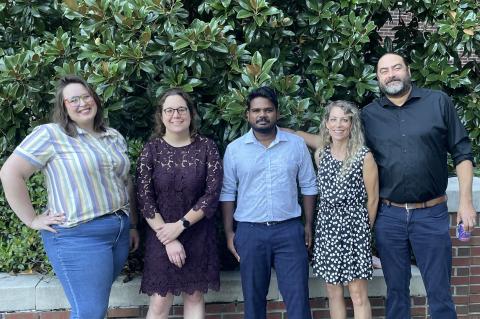
The College of Social Work is eager to welcome all of our students including our latest cohort of doctoral students. Each comes to Florida State University with experiences and a dedication to social work research and scholarship that will benefit the profession and the populations it serves.
Lauren Herod
Originally from Tallahassee, Florida, Lauren has lived all over Florida. She worked in hotel and restaurant management for a number of years in Asheville, New Orleans and Chicago after earning a bachelor’s degree in hospitality administration from Florida State. Moving back to Tallahassee, she worked in administration for a statewide domestic violence organization and realized she loved applying her management training to improve and understand social problems. She also knew she wanted to work with complex trauma survivors using evidence-based practice.
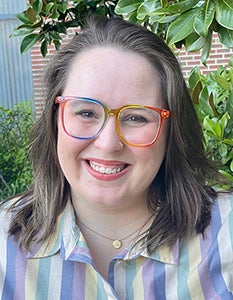
She earned dual master’s degrees in social work and public administration at FSU while also working for the FSU Institute for Justice Research and Development and Voices for Florida and has continued as an adjunct instructor at the College of Social Work. “I began to shape my own lens on how I can combine my personal and professional experiences to my work,” she explained. She sees herself in a support role when it comes to impacting social work and social change, helping to provide the evidence-based tools and knowledge social workers need to create effective change for people in need.
Her research interests focus on implementation science, macro social work, quantitative methods as well as trauma and victimization. Lauren is excited to return to FSU, expressing, “I know for a fact that I’ll be in an environment that both pushes me outside of my comfort zone while simultaneously supporting my efforts.”
Sonnie Mayewski
A licensed clinical social worker and native of Tallahassee, Florida, Sonnie has primarily worked with individuals and families affected by dementia, including conducting research for a Tallahassee Memorial Healthcare study in conjunction with the Mayo Clinic and the University of Florida. She has also held research assistantships with the FSU Behavioral Cardiology Lab and the Florida Center for Reading Research.
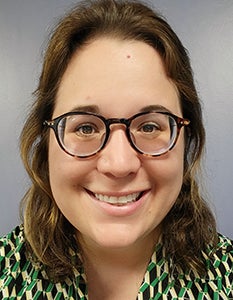
Along with starting her doctoral program, Sonnie will be participating in the Biomedical Entrepreneurship Graduation Certificate Program, learning alongside other disciplines to bring about innovations in healthcare. She is also a recipient of the Legacy Fellowship.
Her research interests focus on identifying and meeting the psychosocial needs of the siblings of children with complex medical needs using a whole-family approach and the integration of technology into healthcare. “Through my internships and volunteer work with the families of children with life-altering illnesses and exceptional needs, I have noticed a need for interventions with this population,” Sonnie described. “While my time at the micro social work level has been invaluable, I would like to contribute to the field of evidence-based interdisciplinary healthcare and educate future generations of social workers.”
She is a two-time FSU graduate and has taught classes for the College of Social Work as an adjunct professor and instructional mentor. “My experiences at FSU were key factors in my decision to return as a doctoral student,” Sonnie expressed. “I am confident that the supportive yet rigorous environment at the College of Social Work will help me grow as a researcher and prepare me for future success.”
Beth Okantey
Originally from Portland, Oregon, Beth Okantey has been working in social work for more than 27 years, both in the United States and abroad. Domestically, she has worked in the area of homelessness, with chronically mentally ill adults, providing counseling for low-income pregnant women and within the child welfare system.
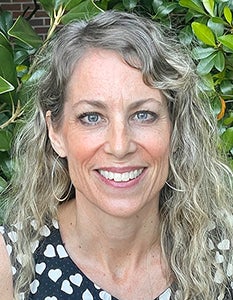
She has spent more than 15 years working internationally, 11 of those years in Ghana, West Africa, developing and coordinating a field education program and supervising 80 students from 17 American universities since 2013. Beth and her husband also created the Palm Institute in Ghana, a small liberal arts college, working to develop ethical leaders. She has worked as a Peace Corps Volunteer in Malawi in East Africa, providing community education on disease prevention and in Ghana, implementing an HIV/AIDS education program.
“I want to pursue a doctoral degree to make a larger impact in social work education focused on understanding, respect, and humility, along with applying relevant practices and responsive engagement skills, assessment tools and interventions,” explained Beth.
She has been teaching at the university level for more than a decade, currently teaching online courses through Portland State University, the University of Arizona Global Campus, the University of Alabama, the University of Nevada at Reno, and Walla Walla University. “I look forward to enhancing my knowledge base by learning from the experienced faculty members and scholars at FSU,” she said. “I was drawn to FSU because of the numerous faculty members and scholars with an international interest and research experience.”
Sanoop Valappanandi
Sanoop hails from the southern region of India and earned his bachelor’s degree in social work from the University of Calicut and master’s degree in social work from Tata Institute of Social Sciences. “Coming from a rural background, I have always been inspired to work for the communities, struggling for better livelihoods and opportunities,” he said about what drew him to a career in social work.
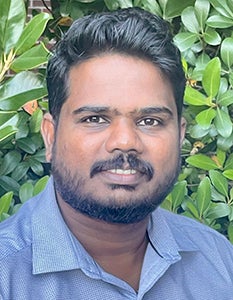
He worked on several research projects during his degree programs in India, working on research related to environmental activism and greatly influenced his research interests. Sanoop also worked for the Foundation for Ecological Security, a leading environmental organization in India, for almost 6 years. His research focuses on environmental justice and social work along with macro social work, community development, qualitative research methods and field experiments.
He was drawn to Florida State University and the College of Social Work for the interdisciplinary nature of the research opportunities available, along with the diverse research interests and methods of the faculty. “I want to understand how political and ecological systems and communities are disadvantaged due to their identity, experience these impacts, and respond to them,” Sanoop explained. “Moreover, I want to improve the lives of communities who are socially and economically vulnerable through my research. I strongly believe that giving back to the populations you study is essential."

